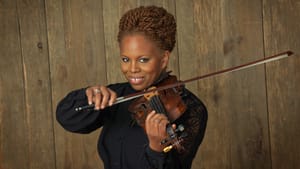Stay in the Loop
BSR publishes on a weekly schedule, with an email newsletter every Wednesday and Thursday morning. There’s no paywall, and subscribing is always free.
When roots music soars
Regina Carter at the Annenberg Center

Fans like to describe their favorite musician as a genius — Regina Carter’s fans can do so with some justification: She won a MacArthur Foundation “Genius” Fellowship in 2006.
With that fellowship money, she spent time traveling in Africa to explore her roots. The ensuing album, Reverse Thread (2010), explored traditional music from Mali, Uganda, Senegal, and elsewhere.
In her 2014 album Southern Comfort, Carter is exploring her more immediate roots: the music that her paternal grandfather, an Alabama coal miner, might have listened to, for which she delved into the field recordings collected by Alan Lomax and John Wesley Work III.
I dutifully listened to the album in preparation for Carter’s recent Annenberg concert and found it listenable but not particularly interesting. I was thus a little nervous about the concert, but the live music magic kicked in, and the evening was phenomenal.
Squeezing, not wheezing
The first solo was, unusually for a jazz concert, by the accordionist, Will Holshouser, who had also appeared on Reverse Thread. Holshouser manages to avoid the accordion’s wheezy chords and emphasizes individual notes. His sound is authentically rootsy, yet clean, the perfect complement to jazz-style roots music.
All of Carter’s collaborators showed equal skill. Marvin Sewell went back and forth between electric and acoustic guitars, playing slide on one number and a strongly plucked, almost percussive, technique on another — both equally effective counterparts to Carter’s lyrical violin.
Drummer Alvester Garnett, who’s played with Carter since her 2000 album, Motor City Moments, provided brilliant support throughout. He also played the first drum solo I’ve ever heard in which the melody came through clearly — a testimony not only to how solidly the tune had been established before the solo, but more importantly to the subtlety and mastery of his technique.
A full-tilt lullaby
Carter herself, of course, is the preeminent jazz musician playing today, and she was the center of gravity. Her playing is powerful, clean, lyrical, and melodic, to pull out just a few of the adjectives from my scribbled notes. She also isn’t afraid to take the tune where she wants it to go — she played one lullaby full tilt in a completely unaccompanied solo, before seguing into “When the Saints Go Marching In,” on which the rest of the band reentered.
She introduced several numbers by playing snippets of the original field recordings that inspired her, including some consideration of the nature of the song (a hymn, a playground game, a lullaby). This gave the audience the melody of the ensuing piece — it’s always helpful in jazz to know the song that’s being riffed on. It also communicated her understanding of the significance of the music, not only in terms of her family history but also in a larger sociocultural sense.
What, When, Where
Regina Carter, “Southern Comfort.” March 28, 2015 at the Annenberg Center, 3680 Walnut Street, Philadelphia. 215-898-3900 or www.annenbergcenter.org.
Sign up for our newsletter
All of the week's new articles, all in one place. Sign up for the free weekly BSR newsletters, and don't miss a conversation.

 Judy Weightman
Judy Weightman